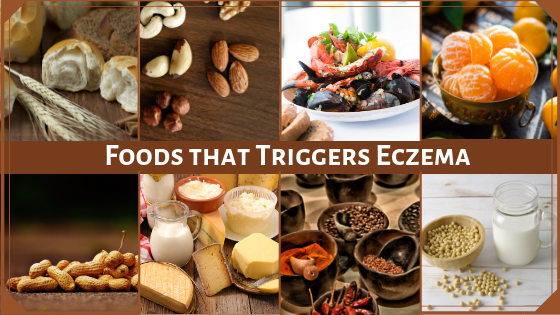We all know that diet is important for maintaining a healthy and well-nourished body, but for people suffering from eczema, the food you eat may be the difference between clear skin and a sudden and irritating flare-up.
If you are experiencing eczema without knowing the cause, it may very well be that you’re eating the wrong food.
In this blog post, I’ll explore 10 foods that may be worsening your eczema and offer some better alternatives so that you can enjoy breakfast, lunch, and dinner without the itchy aftermath.
Please bear in mind that I am in no way a medical professional and while my suggestions may provide relief, you should always speak to a medical professional or nutritionist before making any dietary changes to ensure all essential nutrients are retained – especially when children are involved. – Jennifer Roberge
Eczema in a Nutshell
Eczema is an inflammatory skin condition that causes a person to develop patches of dry, red, itchy skin on their body, most commonly appearing on the face, hands, feet, and back of the knees. It occurs in both babies and adults and can be triggered by a number of factors.
Typically, these irritants include house-hold products like soaps and detergents, extreme hot or cold weather conditions, stress, rough fabrics such as wool, and a variety of beauty products. Because eczema develops due to inflammation, one of the biggest culprits of the condition is actually food.
You can manage and track the food triggers using the eczema app and eliminate it from your diet to keep the eczema flares at bay
Elimination Diet
Although there are plenty of natural creams and medications that offer soothing and calming relief for itchy skin, one of the best ways to relieve eczema is eliminating the triggers that are causing it in the first place. In terms of diet, this means avoiding the consumption of foods that are known to make eczema worse for a certain period of time (usually about a month) and then slowly work these foods back into your diet to determine which caused a reaction.
A food-sensitive eczema reaction will likely occur within 6-24 hours of consuming the food but it’s possible that the reaction may be delayed. [1] If you are having trouble ascertaining which foods exactly are triggering the condition, this helpful eczema elimination diet is a good place to start. Please keep in mind that an eczema elimination diet is only a short-term diet, with the goal being to reduce the intake of the triggering food, if possible.
Track and Manage your Eczema treatment using a comprehensive Eczema App
Download Eczemaless now
Foods to Avoid
While there are common food culprits that may worsen your eczema, it’s important to remember that everyone is different and not everyone will experience the same issues with the foods listed below. Understanding your body and knowing which foods work and don’t work for you personally is crucial, keeping in mind that there is a difference between a food allergy and a food-insensitivity.
- Gluten – Wheat is quite a common allergy in children but thankfully, it’s also one that most children will outgrow by age 10. Usually, the reaction will occur minutes after consuming the wheat, but it’s possible, in some cases, that symptoms won’t appear for a couple of hours after consumption.
- Nuts – Nut allergy is one of the most common food allergies in children and adults. Nuts come in many varieties including pistachios, almonds, walnuts, pecans, cashews, to name a few. If you are allergic to one type of nut, it’s highly likely that you’ll react similarly to other nuts as well – no matter where they grow.
- Soy Products – Unfortunately, soy is one of the most difficult products to avoid if you suffer from allergies as it’s found in many processed foods such as mayonnaise, vegetable broths, frozen meals, and meat substitutes. A soy allergy ranges from mild to severe and usually begins in early life.
- Eggs – As eggs are found in most breads, pastas, cakes, cookies, and cereals, they are a hard product to avoid. Unfortunately, they are also one of the most common allergens, with 2% of children reported as being allergic to eggs [3]. Some egg-free products include macaroni, marshmallows and other types of noodles.
- Dairy – Cow’s milk is the leading cause of allergic reactions in children. Unfortunately, changing from cow’s milk to almond milk is not much help due to the fact that, as mentioned earlier, nuts are another common trigger of eczema.
- Citrus Fruits – Eating citrus fruits, such as oranges, lemons, limes, and grapefruit, can irritate eczema. In fact, even coming into contact with the peel of citrus fruit can initiate extreme itching, dry skin, redness or burning.
- Peanuts – Despite containing the word ‘nut’ in its name, peanuts are actually part of the legume family as they grow underground. That being said, the allergic reaction to peanuts is very similar to that of the tree-nut allergy.
- Shellfish – An allergy to shellfish can develop any time in a person’s life and can be caused by food that you’ve previously eaten with no issues whatsoever. Some shellfish to avoid include shrimp, crab, lobster, prawns, mussels, oysters and squid. Often, shellfish allergic reactions can be unpredictable as they can occur long after the person has consumed the allergen [3].
- Spices – Vanilla, cloves, and cinnamon are common types of spices that cause allergic reactions
- Tomatoes – An allergic reaction to tomatoes will typically occur immediately following exposure to the allergen. As tomatoes are beloved in many dishes (such as pizza and pasta!) they might be frustrating to avoid but thankfully, alternatives such as alfredo sauce and bechamel sauce are tasty replacements
What To Eat Instead
Fortunately, there are anti-inflammatory foods that reduce eczema symptoms. This includes foods that are high in probiotics, such as miso soup, sourdough bread, tempeh, and naturally fermented pickles, as well as foods that are high in quercetin, such as apples, blueberries, kale, broccoli and spinach.
Quercetin is effective in reducing inflammation because it is a powerful antioxidant and antihistamine.
Finally, salmon and herring contain high-levels are omega-3 fatty acids, making them anti-inflammatory and ideal for those suffering from eczema.
e hope this list is helpful in giving you a better understanding of how the food you consume can affect your eczema. Remember to always seek the advice of a medical professional or a nutritionist before making any dietary changes.
References:
[1] https://www.medicalnewstoday.com/articles/320855.php
[2[ https://www.healthline.com/health/allergies/shellfish#foods-to-avoid
[3] https://www.healthline.com/health/allergies/egg#1
About the Author



Jennifer Roberge is the founder of the award-winning Its An Itchy Little World blog and The Eczema Company. Propelled to find a solution for her son’s struggles with eczema, allergies, and asthma, Jennifer has established herself as the go-to resource on integrative and holistic methods, and the best natural products for healing both inside and out.
GET IN CONTROL OF YOUR ECZEMA
Use our AI tool to check the severity of Eczema and keep track of your Eczema progress.

